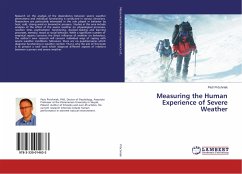Abraham Maslow (1908-1970) was a leading psychologist whose hierarchy of needs has resonated throughout various disciplines. The pinnacle of Maslow's hierarchy was self-actualisation, characterised by the peak experience. However there are a series of definitional, theoretical and methodological issues related to the hierarchy and self-actualisation. Maslow specifically refuted his own theory, instead suggesting that research should be directed towards self-transcendence as characterised by the plateau experience. To date, the plateau experience has remained obscure. This book explores the problematic nature of self- actualisation and the relationship between peak experiences and flow, before progressing to analyse Maslow's composite musings about the plateau experience. From this, a number of defining characteristics are identified, which subsequently inform the development of a psychometric, the Plateau Experience measure (or PLEX). The PLEX has demonstrated secure psychometricproperties and is offered as a resource to investigate the plateau experience further.







